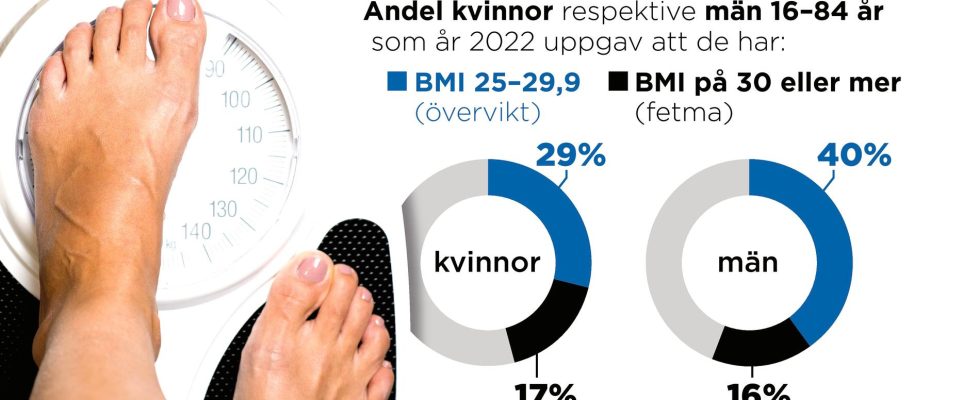Published: Less than 20 min ago
full screen
Next
Proportion of women and men aged 16–84 who in 2022 stated that they are overweight or obese. BMI (Body Mass Index) expresses the ratio between weight and height. BMI is calculated by dividing body weight in kilograms by body height squared (m2).
1 of 2 Photo: Johan Hallnäs/TT
The causes behind obesity can have an impact on the risk of suffering from cardiovascular disease.
New research shows that those who have the “right” obesity genes do better.
People with obesity, or obesity, have a higher risk of suffering from, among other things, cardiovascular diseases. But those who have a genetic predisposition to a high body mass index, BMI, have a significantly lower risk than those who have genes for a low BMI.
The researcher and epidemiologist Ida Karlsson at the Karolinska Institutet is one of the authors of a new study that investigated the connection.
– Obesity is a very complex disease that depends on many different factors. But it seems that there are differences that have to do with the underlying cause. It may be that those who have the genetic predispositions are better able to handle a higher weight.
Used registry
In the study, the researchers looked at data from roughly 15,000 twins born before 1958 or earlier, where there was information on BMI and certain genes. It is not about individual genes that control the risk of developing obesity, but a combination of several hundred thousand variants that are linked to a genetic sensitivity to high BMI.
The researchers also collected data on a range of cardiovascular diseases such as heart attack, angina, stroke and heart surgery.
The conclusion, published in Eclinical Medicine, was that the link between obesity and cardiovascular disease was twice as strong among those who had a genetic predisposition to a low BMI, compared to those whose obesity had mainly genetic factors.
– It is a piece of the puzzle that shows that it is important not only to look at BMI but at other factors when it comes to obesity. Because it is such a stigmatized disease, the results can help us understand that its effects on health differ for different individuals, says Ida Karlsson.
At group level
People all over the world are getting heavier and close to a third of the population is now overweight or obese. Ida Karlsson points out that everyone feels good from eating healthy, exercising and having a healthy weight. But it can be personal which methods work.
TT: How do I know if I have heredity for a high BMI?
– It is very difficult to say. As in all epidemiological research, we can see connections at the group level, but for a single individual it is not possible to say because there are so many genes involved. You can look around the family and perhaps guess if there is a predisposition. But external factors also influence a lot.
Now Ida Karlsson, together with her research group, will go further and investigate how individuals with obesity caused by genetic and lifestyle factors differ in terms of blood sugar, cholesterol and inflammatory markers.
Facts
Obesity
Overweight is when you weigh so much that it can be unhealthy. Severe excess weight is called obesity or obesity. Obesity increases the risk of diseases such as high blood pressure, type 2 diabetes and strain injuries in the joints.
There are different methods you can use to assess your weight. The limits for what is overweight and what is obesity can, for example, be calculated with the help of BMI or by measuring the waist measurement.
There are different ways to treat obesity. The National Board of Health and Welfare recommends combined lifestyle treatment where you get help to create new habits for example food, exercise or sleep.
Anyone over the age of 12 can also try drugs that increase the feeling of satiety, or one that causes the body to absorb less fat. Another treatment is surgery, for example gastric bypass. Anyone who receives medication or an operation also receives help to adapt their lifestyle.
Source: 1177, National Board of Health and Welfare
Read more
